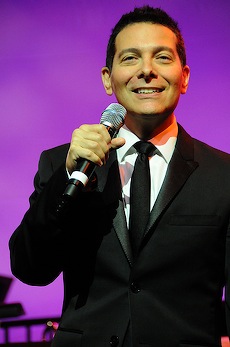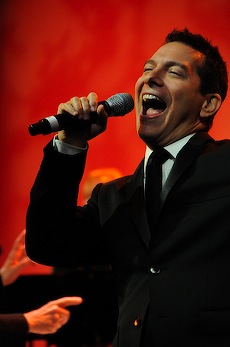Michael Feinstein's American Songbook is chapter and verse on crooner/collector
10/06/10 08:16 AM


By ED BARK
Vocalist/pianist by night, collector/hoarder by day, here's a guy who knows what he likes.
Michael Feinstein worships the kind of music that never goes out of fashion but almost assuredly will never be fully fashionable again. In other words, it's hard to imagine someone downloading "Alexander's Ragtime Band" on itunes.
PBS remains the cardigan sweater of TV networks, though. And that's a very good thing when it comes to the three-part, three-hour Michael Feinstein's American Songbook. It premieres on Wednesday, Oct. 6th at 7 p.m. (central) and continues at the same hour on Oct. 13th and 20. (KERA/Channel 13 is the carrier in D-FW).
The program is a showcase for Feinstein's considerable talents and a testament to his persistence in preserving and re-recording tunes that otherwise might never be heard again. Discovering alternative lyrics to "There's No Business Like Show Business" and singing them with gusto is the kind of thing that sends Feinstein over the moon. He can't disguise his contempt for all the material that has been destroyed due to "the ignorance of people in charge."
Wednesday's first hour, subtitled "Putting on the Tailfins," finds Feinstein onstage, at an Indiana flea market and knowledgeably dissecting performances from the likes of Frank Sinatra (whom he adores) and Rosemary Clooney (whom he adores even more). Composers George and Ira Gershwin also are gods to him. As a younger man, Feinstein regularly visited lyricist Ira, cheering the old man with his intricate knowledge of music from another era.
"I believe he lives in a different world," says his associate and live-in partner Terrence Flannery.
Feinstein's parents, with whom he still seems to have a somewhat prickly relationship, say he was a perfectionist even as a little boy. Kids who came over to the house to play Monopoly were told to go home if they didn't play it Michael's way, his mother, Mazia recalls in next Wednesday's Hour 2 ("Best Band in the Land").
But she doesn't say this with any rancor. Feinstein may be persnickety and single-minded, but his overall net worth to society is off the charts. Whether performing the standards he loves (in about 150 shows per year) or rescuing the music of bygone times, he's a crooner/curator of considerable value. Who but Feinstein would have dug up Margaret Whiting's performance of "One Hour With You" from the World War II era and then played it for her in her home? She's touched, he's beaming and all seems right with the world.
Feinstein also documents the travails of black musicians and the sad irony of Harlem's segregated Cotton Club, where whites went to hear black music while blacks were denied admission. In Hour 3 ("A New Step Every Day"), he even makes a persuasive case for Al Jolson being an early version of Elvis Presley. Their hip gyrations were virtually identical, says Feinstein, who also notes that Jolson reveled in being a very sexual performer and lady killer. A vintage clip pretty much bears this out.
There's also a visit with Joe Franklin, the seemingly eternal New York City TV/radio interviewer whose storage areas are land-filled with stuff collected and strewn about. Even Feinstein looks a bit overwhelmed, but of course appreciates the value of being able to dig for buried treasure. An ancient piece of sheet music still makes his heart go pitter-pat -- as does a dusty tape of a onetime radio performance that otherwise would be forever silenced.
Feinstein's passions are fully communicated throughout these three hours. And each of them fittingly ends with his full-length performance of an old chestnut. At age 54, he's still vigorous of voice and messianic about recapturing and preserving the music that keeps him humming.
There are far worse things to do with one's life. And at least he's not a dedicated devotee of The Bay City Rollers.
GRADE: A
